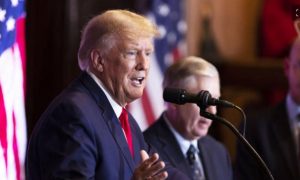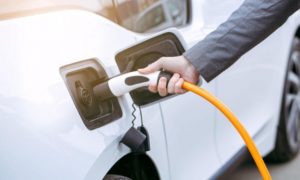WASHINGTON—The Biden administration is discussing raising tariffs on some Chinese goods, including electric vehicles, in an attempt to bolster the U.S. clean-energy industry against cheaper Chinese exports, people familiar with the matter said.
Read More : 3 Overvalued Stocks That Could Plunge if the Market Crashes
Biden administration officials, long divided over trade policy, have left in place Trump-era tariffs on roughly $300 billion of Chinese goods. But officials at the White House and other agencies are debating the levies again, the people said, with an eye on wrapping up a long-running review of the tariffs early next year.
Chinese EVs are already subject to a 25% tariff, which has helped prevent subsidized Chinese automakers from making inroads into the U.S. market. Raising that tariff likely would have little immediate impact on U.S. consumers. Other targets for potential tariff-rate increases are Chinese solar products and EV battery packs, the people said. While the U.S. now primarily imports solar material from Southeast Asian countries, China is still an important supplier of EV batteries.
Raising some tariffs could allow President Biden to signal he is tough on China as he approaches a 2024 re-election campaign that could again see him face Donald Trump.
The Biden administration is also considering lowering tariffs on some Chinese consumer products that officials don’t see as strategically important, in addition to the potential increases on clean-energy products, the people familiar with the conversations said.
Read More : 3 dramas on Prime Video you need to watch in December
The administration hasn’t decided on the tariffs, the people said. Previous internal discussions about adjusting tariffs on China fizzled out without any changes. Spokesmen for the Office of the U.S. Trade Representative and the National Security Council declined to comment.
The conversations have picked up recently as officials grow concerned about Chinese clean-energy exports, which are flooding global markets at low prices as China’s domestic economy slumps. U.S. officials worry that American companies, even with the protection of existing tariffs and new subsidies, won’t be able to compete with China’s production.
“China is determined to dominate the electric-vehicle market by using unfair trade practices, but I will not let them. I promise you,” Biden said in November before a crowd of United Auto Workers members.
The current push to raise some duties is a shift from earlier rounds of discussions over the tariffs, when conversations focused on whether to lower them. Some officials, such as Treasury Secretary Janet Yellen, previously pushed to decrease some of the duties, arguing that the tariffs didn’t achieve a strategic purpose. They also saw reducing tariffs as a way to combat high inflation in 2022.
U.S. Trade Representative Katherine Tai, among others, sought to keep the tariffs in place to keep pressure on Beijing.
Read More : Trump says he never read Hitler’s ‘Mein Kampf,’ doubles down on anti-immigrant phrase
Raising tariffs on Chinese exports could complicate U.S. efforts to stabilize relations with China, which has pushed the Biden administration to drop Trump-era levies. A presidential election in Taiwan next month is already poised to stress the bilateral ties.
“The stabilizing momentum in U.S.-China relations should not be disrupted by domestic politics. The U.S. used to call for letting the market decide. Why should it reverse course now?” Xie Feng, China’s ambassador to the U.S., said at a recent gala event hosted by the U.S.-China Business Council.
Trade with China is quickly emerging as a major issue in the 2024 presidential contest. Trump made going after China a signature issue in his presidency and, on the campaign trail, has argued that Biden’s clean-energy push will ultimately benefit China. Other Republicans have at times sought to portray Biden as going easy on China.
Robert Lighthizer, who led trade policy during the Trump administration and advises the former president, has been in touch with congressional Republicans on trade, people familiar with the matter said. Testifying before the House select committee on China earlier this year, he called for the U.S. to raise tariffs on China.
Read More : Five Books to Make You Smarter About Money
Sens. Sherrod Brown (D., Ohio) and Bob Casey (D., Pa.), each running for re-election next year in competitive states, warned Biden in a letter last month against lowering any tariffs on China.
“These tariffs are essential to level the playing field for American workers to compete and counter unfair trade practices by China,” they wrote.
Under the Biden administration, the U.S. has sought to help American companies compete with China, which dominates many clean-energy sectors. The renewable-energy and drug-cost law known as the Inflation Reduction Act offers incentives to companies that manufacture goods without input from China.
EVs have been a focus of that effort. The U.S. barred EVs containing battery materials from China from eligibility for a $7,500 consumer subsidy. But U.S. officials feared domestic automakers couldn’t compete without some collaboration from Chinese companies.
Read More : Five Books to Make You Smarter About Money
The administration wrote the subsidy rules in a way that leaves room for U.S. automakers to work with Chinese companies operating in the U.S. or third countries to manufacture batteries.
Some automakers and members of Congress are worried that those subsidies, along with the existing tariffs, might not be enough to protect the U.S. market from relatively inexpensive Chinese EVs. China is already one of the world’s largest auto exporters, and its EVs are often the cheapest available. The European Union recently opened an investigation into raising tariffs on Chinese EVs.

























